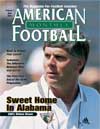AMERICAN FOOTBALL MONTHLY THE #1 RESOURCE FOR FOOTBALL COACHES
Article CategoriesAFM Magazine
|
Leading By ExampleOklahoma athletic director Joe Castiglione has taken the Sooners back to the top by empowering his staff for success.by: Rod Smith © More from this issue Just four short months after assuming the reigns of the University of Oklahoma athletic department, Sooner athletic director Joe Castiglione made a decision that would shake the OU football program out of its recent doldrums and head it toward a sudden and glorious future. He hired Bob Stoops as head football coach. Prior to his arrival in Norman, Castiglione - a former football walk-on at the University of Maryland - spent 18 years rebuilding the pride and solidifying the infrastructure of the athletic department at the University of Missouri. Now, in a little more than three-years at Oklahoma, Castiglione has breathed both financial and emotional life back into a once deflated Sooner athletic department. Since his arrival at Oklahoma in April of 1998, Castiglione has made fund-raising a priority and has successfully garnered a ....The full article can only be seen by subscribers.
|
|
|||||||
| HOME |
MAGAZINE |
SUBSCRIBE | ONLINE COLUMNISTS | COACHING VIDEOS |
Copyright 2025, AmericanFootballMonthly.com
All Rights Reserved





